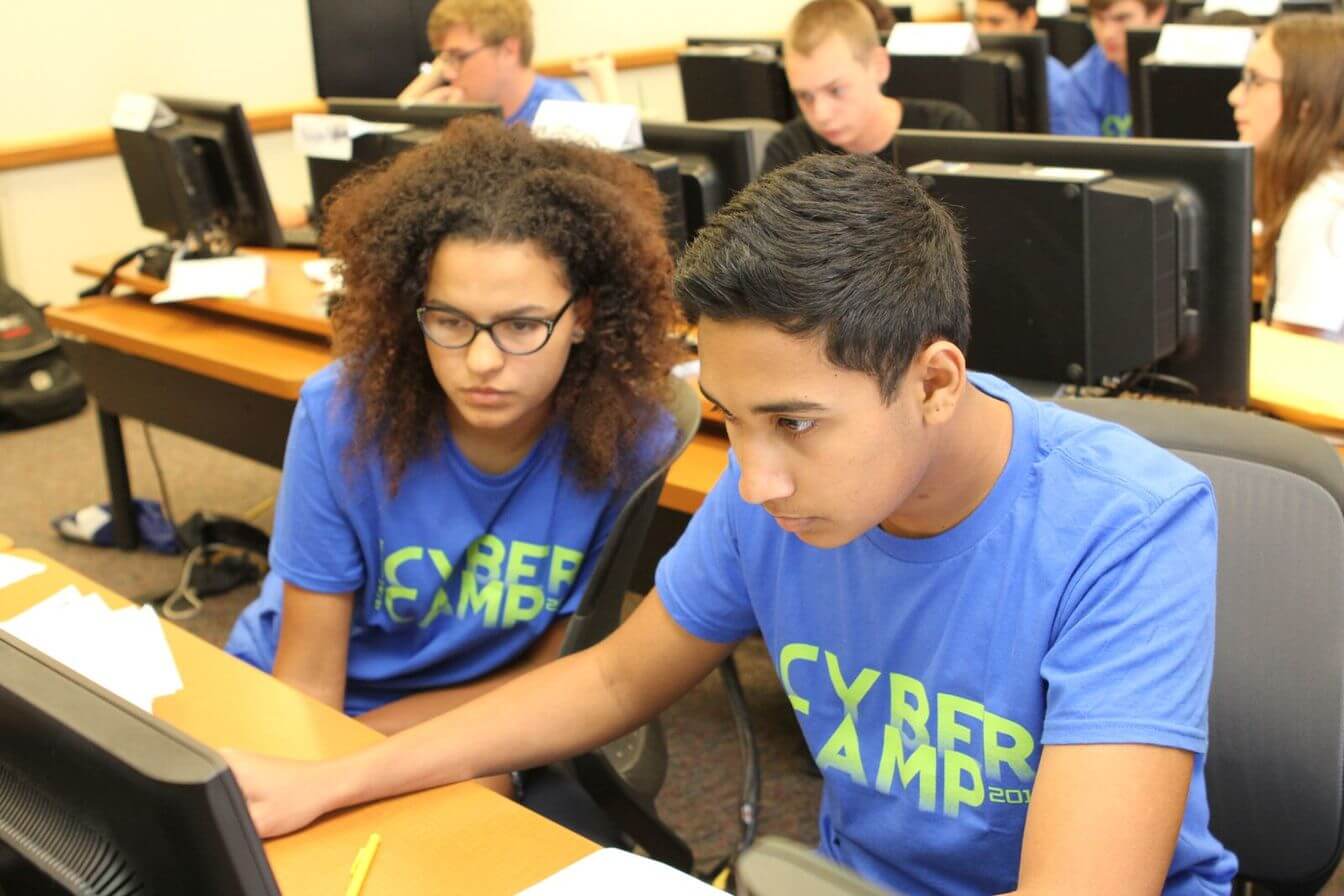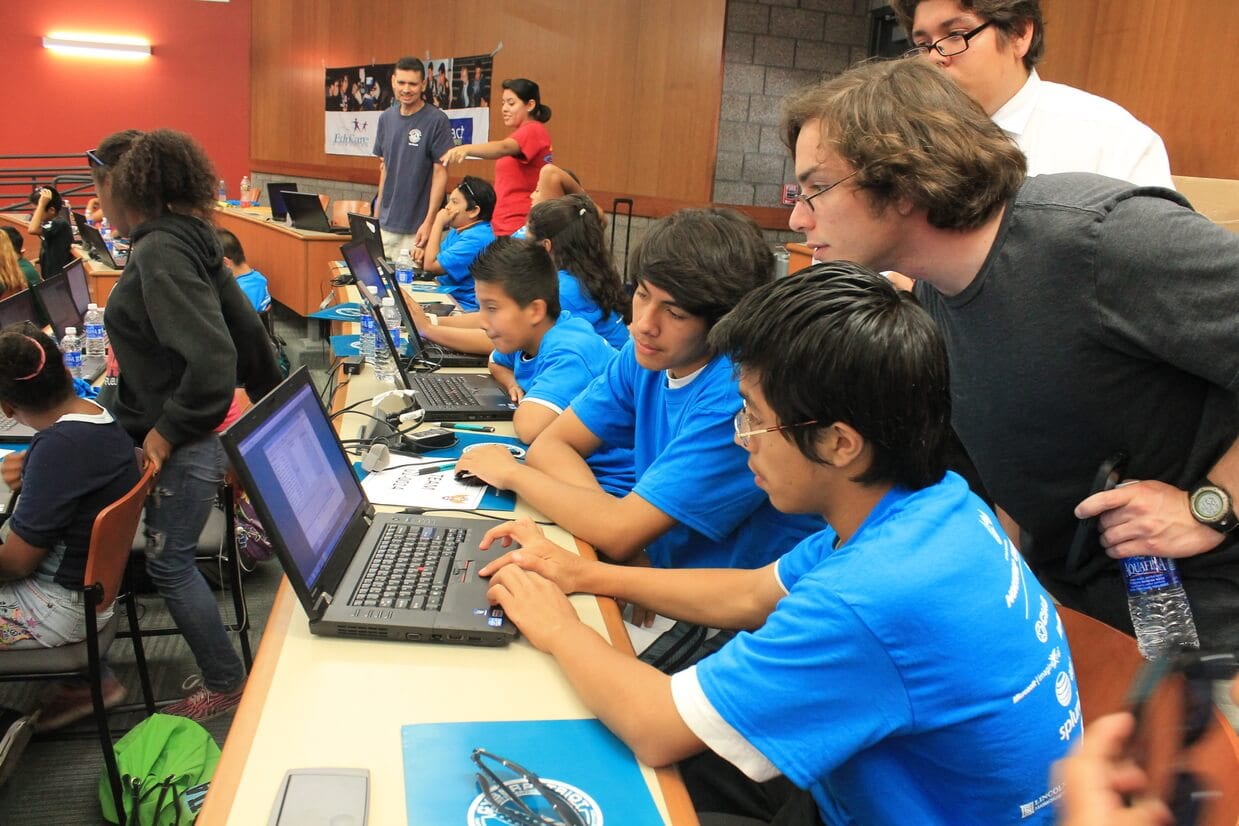I am always excited to share new ways to expose kids to technology with parents. Today’s post focuses on cybersecurity, a field within computer science, and how kids in middle and high school can learn about this important, relevant, and intellectually stimulating field. In particular, we’ll look at two particularly robust cybersecurity summer camps available for teens, with locations around the country.
These days we hear a lot about cybersecurity in the news, especially when there are cyber attacks and threats to businesses, the government, and our own personal information. As we rely on the internet for practically everything today, online security has become essential on many levels.
With constant and growing threats, the need for cybersecurity professionals is more important than ever. The US Department of Homeland Security defines cybersecurity as “the art of protecting networks, devices, and data from unauthorized access or criminal use and the practice of ensuring confidentiality, integrity, and availability of information.”
In this emerging field, you may not have a clear impression of who works in cybersecurity. What does the work entail? Is this a good opportunity for young people to pursue? How early can a student start learning the complexities of cybersecurity? Read on for the answers to these questions—and more!

Why Cybersecurity?
Cybersecurity experts are in demand! Today, there is a cybersecurity skills shortage, plain and simple—the global shortage of cybersecurity professionals is estimated to be 2.72 million.
Cybersecurity experts are in high demand because everything from our personal data to government servers are at risk for breaches, requiring skilled individuals who can protect that information.
And, cybersecurity isn’t just one job—it’s a varied and dynamic collection of careers. Data Scientist, Software Security Developer, Data Security Analyst, and Chief Security Officer are just a small sample of the various careers students with a background in cybersecurity can pursue. Cybersecurity relies on a well-rounded skill set, so there’s room for people with all different interests and work styles. For example, one person might be a programmer working on code development, while another person may design and oversee a company-wide system. Someone else might be responsible for analysis and reporting and another might oversee intrusion protection and detection.
For kids who love puzzles and logic problems, cybersecurity can be an exciting gateway to the world of computer science. And it can introduce them to an intellectually satisfying profession that will offer them the choice of many different work settings and career paths.
Why Attend a Cybersecurity Summer Camp?
Universities are responding to the need to prepare the next generation of cybersecurity professionals by adding cybersecurity degrees within their computer science curricula. But how would a teen know enough about this emerging field to consider it as a major? In answer to this question, a number of summer camps are helping students explore the field and learn cybersecurity principles and skills before they enter college. These summer experiences give them the chance to learn how cybersecurity works, get some foundation skills, and explore career possibilities.

Featured Programs
AFA CyberCamps and GenCyber are two significant cybersecurity summer programs, with hundreds of camps held around the country each summer. Both programs were established in 2014 by government-related organizations and have grown in size and popularity over the years. The following program descriptions include details about the curriculum and how you can find a camp near you.
The CyberCamps program was launched by the Air Force Association in 2014, and is designed for high school and middle school students who are just getting into cybersecurity or who have some cybersecurity knowledge and want to learn more.
Students are taught the fundamentals of securing computer operating systems for both Windows OS and Linux OS. They learn security features and functions while learning commands in terminal and command prompt. Security settings in the operating systems—like password policies—are explained and techniques for updating and creating a stronger, more secure system are demonstrated.
CyberCamps are hosted at hundreds of camps, both in person and virtually, across the nation. The cost per student is dependent on the organization that is hosting a camp.
Students interested in attending a Standard or Advanced Camp can email [email protected] to be notified once camp locations and dates are posted online. This email notification from the CyberPatriot office is sent the first week of May.
“The CyberPatriot program allows students to have an advanced knowledge of Cybersecurity that is on the collegiate level and to learn highly in demand STEM skills that are essential in today’s job force.” – Helene Daage, CyberPatriot Program Office
The mission of the GenCyber program is to grow and improve cybersecurity education in the US. Funded by the National Security Agency (NSA), the National Science Foundation (NSF), and the Office of the Director of National Intelligence (ODNI), the program is free to participants. GenCyber launched in 2014 with eight camps across the US, and it now funds over 100 camps each year. GenCyber camps are typically hosted in approximately 45 states and in DC and Puerto Rico every year.
GenCyber summer camps are offered at colleges, universities, community colleges, and school districts for both students and teachers at the K-12 level. The camps provide students with age-appropriate cybersecurity activities in an organized curriculum, distinctive to each camp. Each camp must teach cybersecurity principles and concepts, online safety, and ethics.
Each individual camp is unique, which is a strength of the GenCyber program! For example, at Cape Cod Community College, the camp has incorporated space curriculum into the program. In contrast, the University of Massachusetts Lowell hosts a camp in their Cyber Range, a center for cybersecurity education, research, and workforce development. Additionally, the national GenCyber program now requires pre and post-camp outreach, so participants get more engagement and opportunities beyond just a summer camp experience. GenCyber also introduces participants to careers in cybersecurity so that students can understand how cybersecurity skills can be used in a professional setting.
You can find camp location information at gen-cyber.com. Both the dates and location for each camp can change from year to year. GenCyber encourages interested parents, students, and teachers to reach out to the individual organizations to learn more about a specific camp.
“GenCyber is a great opportunity to introduce young Americans to the exciting possibilities within cybersecurity! Cyber touches everything. We use computer networks for just about everything we do in our current way of life. Cybersecurity is needed in the critical sectors of manufacturing, transportation, defense, government, healthcare, and finance. In the coming years, the US will be facing a major shortage of cybersecurity professionals, leaving our nation’s businesses, governments and critical infrastructures vulnerable to attack. By introducing students in elementary, middle, and high school to the possibilities in the cybersecurity field, we are helping to feed the pipeline for our nation’s future cyber first responders. GenCyber also introduces an exciting and diverse domain with which to experiment, where students can discover their strengths, learn new skills and enrich their education and lives.” – Diane M. Janosek, Commandant of the National Cryptologic School at the National Security Agency
University Programs
In addition to the programs featured here, there are other cybersecurity programs available throughout the country. Your local university is a good place to start—check and see if they offer a pre-college program. For example, NYU, the University of Maryland, Marist College, and Northeastern offer programs. Like other summer programs, university-based programs vary in length, focus, cost, and amenities, so read their websites carefully and contact them with your questions.
Other Summer Programs
In addition to the programs featured here, I am starting to see companies offer cybersecurity camps. For example, in the Boston area, Boston Leadership Institute offers cryptography and codebreaking and cybersecurity programs, and many Code Ninjas centers offer a camp called Code Breakers. To find a program in your area, it’s best to search online for “[your town] cybersecurity summer camps near me.”
Interested in Learning More?
If your child is interested in exploring cybersecurity during the school year, read my article Learn Cybersecurity: Competitions, Classes & Workshops for Teens. I profile cybersecurity competitions and programs that teach students the basics, build their skills, and challenge their puzzle-solving abilities.
Image credit: Air Force Association








Comments on “Cybersecurity Summer Camps for Teens”
Thank you…from a Nana in Georgia!